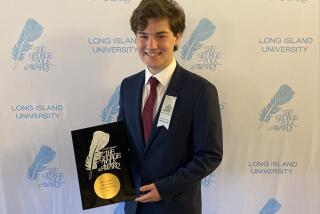Johnsonâs Coach Alleges Drug Test Was Sabotaged
TORONTO â Ben Johnsonâs coach, Charlie Francis, said Monday that he believes the Canadian sprinterâs drug test was sabotaged after Johnson had won the 100 meters at the 1988 Summer Olympics in Seoul, testifying that an unidentified stranger joined Johnson in a waiting room before the test and could have spiked his drink with an anabolic steroid.
The plot thickened when Francis said that two witnesses told him that the stranger had spoken with Johnsonâs rival, Carl Lewis, in another area of the waiting room, where the U.S. sprinter was taken for his drug test after finishing second in the race.
But how deeply, or even whether, Francis intended to implicate Lewis in the alleged sabotage remained unclear at the close of his fourth day of testimony before the Canadian governmentâs commission of inquiry into drug use by athletes.
Although he seemed to steer Francis toward potentially explosive speculation concerning Lewis, Robert P. Armstrong, the commissionâs co-counsel, abruptly tried to defuse it when Francis suggested a connection between Lewis and the stranger.
âI donât want you to read too much into this,â Armstrong warned Charles L. Dubin, the Ontario associate chief justice who is presiding over the inquiry.
Lewisâ Canadian legal representative at the inquiry, Tim Danson, called Francisâ testimony âclassic hearsay.â
Danson was hired by Lewis specifically for this hearing, in case the U.S. sprinter was implicated.
âNo one can besmirch the reputation of my client without a challenge,â Danson said.
Lewis was introduced into the proceedings near the end of Francisâ four-hour testimony, most of which focused on the mystery of Johnsonâs positive drug test at the Olympics.
If Francis can be believed, there is no longer a question that Johnson used steroids. His coach of almost 12 years has testified that Johnsonâs meticulously planned steroid program began in 1981 and continued until three weeks before he competed in Seoul.
Between the time that Johnson set the world record of 9.83 seconds at the World Championships in Rome in August, 1987, and the first round of the Olympic 100-meter competition on Sept. 23, 1988, Francis said that Johnson injected steroids during five different periods. The last, he said, was between Aug. 24 and Sept. 2.
Among the substances that Johnson used during that period, Francis said, were furazabol (a steroid), synthetic human growth hormone and a diuretic, which conceals drugs in the system by diluting urine. All three are banned by the International Olympic Committee.
But the drug that was discovered in Johnsonâs urine sample was another steroid, stanozolol, which Francis contended that the sprinter had not used since the spring of 1987. Since that is a steroid that normally does not remain in the system for more than seven to 14 days, the question is how it found its way into Johnsonâs urine sample.
One possibility raised by Armstrongâs questioning is that Johnson took the stanozolol in Seoul from a bottle of tablets that he had been given in the fall of 1985 by his physician, Jamie Astaphan from the Caribbean island of St. Kitts.
Francis said that he never saw the bottle after the spring of 1987, but he added that he did not believe that Johnson would have taken any tablets from it so close to an important competition.
âIt would have made no sense for Ben to take stanozolol at that time,â Francis said. âIts strength-enhancing capabilities wouldnât work at the last minute. Even with only four milligrams, it creates stiffness (in the muscles). Itâs not something anyone would take deliberately because it would slow down the ultimate performance.â
Two days after Johnson had won the gold medal in the 100 meters with a world-record time of 9.79, Francis said that he learned about the positive test for stanozolol.
âI was totally shocked,â he said. âI thought right away that something has to be dramatically wrong here.â
When Johnson was confronted with the news later in the day at the laboratory by Dr. Arnold Beckett of London, a member of the IOC medical commission, Francis testified that the sprinter said, âI knew there was something wrong with that guy.â
Asked to elaborate by Beckett, Francis said that Johnson described a 6-foot, 160-pound black American man who was present in the waiting room adjoining the testing facility even though the man did not appear to have a credential allowing him access to the area.
According to Francisâ testimony, Johnson said that the man sat near the beer that is provided for the athletes to facilitate them in providing urine samples.
âHe offered Ben a drink on several occasions,â Francis said. âIn some instances, Benâs (vision of the) drinks was obscured. He came over and sat by Benâs head while he was being massaged. Ben and the man were drinking beer and watching television.â
Johnson alleged that there were several other violations of IOC protocol in the testing procedure, Francis said. Francis said that Johnson claimed several people were in the area without proper credentials, including some who were collecting autographs, and that the man assigned to supervise the testing, Dr. Arne Ljungqvist of Sweden, left the area at one point to find a camera so he could have his picture taken with Johnson.
Francis said that Ljungqvist denied the charges when confronted by Beckett.
But Francis said that the two people who were allowed to accompany Johnson to the testing area, his physical therapist, Waldemar Matuszewski, and a security guard, Don Wilson of the Royal Canadian Mounted Police, confirmed the presence of the mystery man, although they identified him as white. Francis said they later agreed that he may have been a light-skinned black man.
Francis said that the sabotage hypothesis gained credence with him after a conversation with Beckett, the director of an IOC-approved laboratory in London.
âHe said it would be an ideal substance if you wanted to spike someoneâs urine,â Francis said. âHe said that it could be excreted into the urine within 45 minutes to an hour.
âI began to suspect that (stanozolol) was administered to him in some way that he didnât know about, that I didnât know about, that Dr. Astaphan didnât know about. It had to have been administered to him.â
That was the theory presented to officials of the Canadian Olympic team on Monday night, Sept. 26, two days after the race, as they prepared an appeal to the IOCâs medical commission. Richard Pound, a Montreal attorney and an IOC vice president, spoke on Johnsonâs behalf later that night before the medical commission.
Francis said he learned from John Holt, secretary general of the International Amateur Athletic Federation, which governs track and field, that the appeal was denied.
âHe said that Dick Pound did an excellent job in presenting the defense, that it was clearly an excellent defense,â Francis said. âBut he said (the commission ruled) that Ben had a profile that showed indefinite long-term use (of steroids), and that was the evidence against him.
âI was completely shocked at that because it came out of left field. That was not a test recognized by the IAAF or the IOC to be used on athletes. If it was, why wasnât it used on every athlete?â
The sabotage theory is not new, although Monday was the first time that a mystery man in the testing area was mentioned. Larry Heidebrecht, Johnsonâs agent, had said in Seoul that his client was a victim of foul play, claiming that a âgooey, yellowâ substance had been put a liquid elixir prepared for Johnson by Astaphan.
Dr. Don Catlin, director of the Paul Ziffren Analytical Laboratory at UCLA, confirmed in an interview Monday night that stanozolol would have reacted quickly if ingested within 45 minutes to an hour before a test.
âItâs unlikely but not impossible that sabotage could occur,â he said. âIn every case, you have to keep an open mind about the possibility of sabotage.â
As for Lewis, Francis said that the U.S. sprinter and Johnson were in the waiting area at the same time but that they were in different sections of the room.
Francis said that both Matuszewski and Wilson noticed a brief encounter between Lewis and the stranger.
âApparently, there was some communication between Carl and the stranger,â Francis said. âIt was nothing more than an acknowledgement, I understand.â
Francisâ distrust of Lewis, and those surrounding him, was apparent earlier Monday, when he indicated that he was suspicious of Jack Scott, a physical therapist from Berkeley who treated both Lewis and Johnson at different times last year.
Francis said that Scott began working with Johnson at Astaphanâs behest and that he, Francis, never would have allowed it if he had known that Scott also was associated with Lewis.
Scott said in an interview Monday night that Francis was trying to protect the reputations that he and Astaphan established through the years as experts at beating steroid tests.
âThese guys were thought of as the top steroid people in the world,â Scott said. âThey canât admit they screwed up. Itâs part of their professional pride.
âReal life usually is not a conspiracy theory, but real people bumbling along trying to do their best.â
More to Read
Go beyond the scoreboard
Get the latest on L.A.'s teams in the daily Sports Report newsletter.
You may occasionally receive promotional content from the Los Angeles Times.






